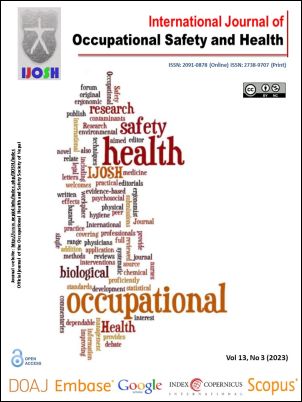Gender-based violence against female sex workers in Nigeria: how helpful are grassroot interventions?
DOI:
https://doi.org/10.3126/ijosh.v13i3.45980Keywords:
Gender-based violence, female sex workers, interventions, rapeAbstract
Introduction: Gender-based violence (GBV) against female sex workers (FSWs) increases their risk of unwanted pregnancies, abortion, HIV, and other sexually transmitted infections (STIs). Hence, this study aims to assess the impacts of grassroots interventions on GBV against FSW in Benue State, Nigeria.
Methods: The study is a cross-sectional baseline-post-intervention survey using a randomized cluster sampling technique. It was carried out in six local governments of the State using structured questionnaires to collect data from the respondents. Data were analyzed using IBM Statistical Package for the Social Science (SPSS) version 25.0.
Results: This study comprised 446 FSWs with 223 from each baseline and intervention survey. The prevalence of GBV was 48.0% in the baseline and 59.2% in the intervention (P<0.001). The most common GBV were being beaten/battered/kicked (26.0%) in the baseline and 30.9% in the intervention (P>0.05). Paying partners (65.6%), the police (53.0%), and vigilantes (30.3%) were the top perpetrators of GBV in the post-intervention study, higher than 41.3%, 17.5%, and 3.9% in the baseline (P<0.001). Access to health care services after GBV was 43.0% in the baseline and 72.7% in the intervention (P<0.001). Only 24.2% of post-intervention respondents would keep cases of GBV to themselves instead of reporting them to appropriate authorities, compared to 53.3% in baseline (P<0.001).
Conclusion: The study recorded higher reports of GBV among the FSWs after the intervention than at the baseline, in which most cases of GBV were underreported. The increased ability to report cases among FSWs after intervention helped to improve the boldness of the victims in reporting the GBV.
Downloads
Downloads
Published
How to Cite
Issue
Section
License
Copyright (c) 2023 Bartholomew Boniface Ochonye, Paul Olaiya Abiodun, Felix OLANIYI Sanni, Tewobola Olufunke , Tolu Abosede Alamu , Ngozika Ogbonna

This work is licensed under a Creative Commons Attribution-NonCommercial 4.0 International License.
This license enables reusers to distribute, remix, adapt, and build upon the material in any medium or format for noncommercial purposes only, and only so long as attribution is given to the creator.





